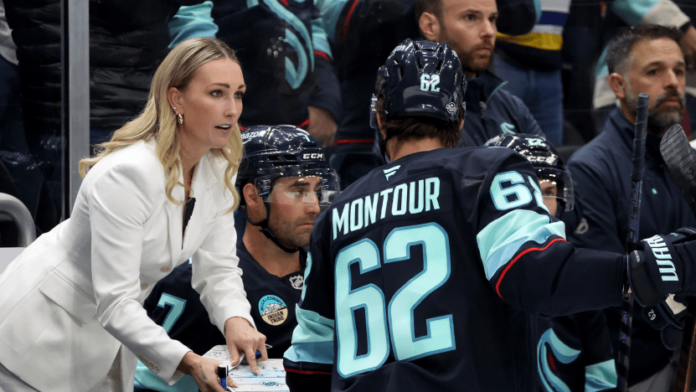Jessica Campbell is no stranger to making history. She is the first female full-time assistant coach in NHL history. She is behind the bench for one of the league’s newest franchises, the Seattle Kraken.
After her playing career ended in 2017, the Saskatchewan native began her coaching career. Her first professional stop came in Europe in 2022, where she was the assistant coach for the Nuremberg Tigers of the Deutsche Eishockey Liga.
In doing that, she became the first woman to coach at the national level of men’s hockey.
After her stint in Europe, Campbell became an assistant coach for the Coachella Valley Firebirds of the American Hockey League (AHL), becoming the first woman to coach in the AHL. She held the position in Coachella Valley for two years.
Despite her past achievements and work around making hockey equal for everybody, the high point of Campbell’s coaching career came this past summer.
On May 28, the NHL’s Kraken hired Dan Bylsma as their head coach. The team’s former head coach, Dave Hakstol, was let go following a season that saw the team finish with a record of 34-35-13.
Then, Bylsma hired Campbell as an assistant coach on July 3. Bylsma and Campbell worked together during the past two years for Coachella Valley.
“The year ahead is going to be a lot of fun. But to know and to understand that obviously there’s still at the forefront the thoughts of other women and other people who have the same aspirations as I do,” Campbell told NHL.com before her debut on Oct. 8 against the St. Louis Blues. “So, to carry that torch every day and keep my focus on being a coach, but it definitely puts meaning into the work.”
The hiring of Campbell by the Kraken is one of the ways the NHL is working to improve its gender equality. Before Campbell, only five women held front-office positions around the league, according to the NHL’s 2021 diversity report.
Some of those women include Emile Castonguay of the Vancouver Canucks and Hailey Wickenheiser of the Toronto Maple Leafs.
News of Campbell’s hiring has made its way to Fredericton. Some people in the city, like Meghan Beland from She is Active New Brunswick, have called the news “exciting.”
“This [is] a big moment, not only for Jessica Campbell herself, but for women’s representation in sport. The past year has been an exciting time of growth for women’s sport, especially with the start of the PWHL [and] the success of Canadian women at the Paris Olympics and Paralympics. Jessica Campbell’s hiring only adds to the momentum,” said Beland.
“Women continue to be underrepresented in coaching positions, especially at the higher levels, so it’s great to see the excitement surrounding Campbell’s start with the Kraken.”
She is Active New Brunswick is a key player in supporting women and girls’ engagement in sport, recreation and physical activity, pushing for gender equality in sport across the province.
“We work to break down barriers … and build the capacity of leaders, coaches, organizations and communities [in sport]. Our work falls under three priority areas: participation, building capacity and advocacy and communication,” said Beland.
She is Active offers several initiatives, all of which aim to achieve the group’s main goal of breaking the barriers young women and girls face in sport. Those programs include providing education on gender equity, offering professional development and networking opportunities for women leaders in the sport and recreation field and many more.
“By addressing barriers, we aim to create inclusive environments where women and girls feel supported, which is an essential component of gender equity.”
When asked about how the hiring would help create more opportunities for women as coaches in sport, Beland thought that Campbell’s hiring was good for creating more role models in hockey, especially for young women and girls. This is because role models are crucial, as she said women and young women often “see it to be it.”
“Historically, women have been underrepresented in all areas of high-level sport, whether as athletes, coaches and officials. This often means that younger girls don’t have relatable role models in sport,” said Beland. “In her new role, coach Campbell is a visible, forward-facing role model for so many women and girls, proving that women can coach at the highest levels.”
Right now, St. Thomas University has several coaches who are female According to a survey by NB Jobs, over 61 per cent of coaches in the province are women.
“Sometimes it only takes one role model to show women and girls what they can become,” she said.

